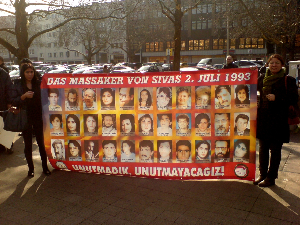Turkey Remains an "Angry Nation" But Could Still Serve as a Democratic Inspiration
By Kerem Öktem (vol. 4, no. 5 of the Turkey Analyst)
Turkey remains an “Angry nation”, tormented by the many ghosts of its history, some of which still lurk in the shadows. Its political system is characterized by deep polarization, and it is by no means certain that the ruling Justice and Development Party (AKP) will go on to dismantle the edifice of state tutelage bequeathed by the “guardians” who have now been put on the defensive as never before in the history of the republic. Yet even if the country’s immediate prospects remain ambiguous, the people of Turkey have nonetheless used the ballot box several times to successfully defy authoritarianism and military diktats. That deserves to serve as an inspiration for others in the Middle East.
Watching the Horizon: Turkey's Beleaguered Alevis
By Gareth Jenkins (vol. 7, no. 11 of the Turkey Analyst)
Prime Minister Recep Tayyip Erdoğan’s attempts to tighten his grip on power by stoking social tensions and propagating conspiracy theories have exacerbated the already widespread concerns of Turkey’s heterodox Alevi religious community. Many Alevis now fear that not only their culture and lifestyles but also their lives are at risk.

Could Turkey's "Glasnost" Establish Equality as the Founding Principle of the State?
By Halil M. Karaveli (vol. 2, no. 23 of the Turkey Analyst)
With its policies of a “democratic opening”, the AKP government has embarked on an enterprise that ultimately challenges the core identity of the republic as a specifically Turkish state. The revulsion that the notion of putting Turkishness on an equal footing with the other identities of society is eliciting suggests that it may, once again, prove difficult to find a liberal way out of the perennial dilemma of Turkey – to establish a secure foundation for the state in a setting of societal heterogeneity.
Turkey's "Kurdish Opening" Faces New Challenges
By Gareth H. Jenkins (vol. 2, no. 19 of the Turkey Analyst)
The October 24 announcement by Prime Minister Recep Tayyip Erdogan that he was postponing the planned arrival in Turkey from Europe on October 28 of 15 members and sympathizers of the outlawed Kurdistan Workers’ Party (PKK) was a tacit admission that the ruling Justice and Development Party (AKP) had seriously miscalculated a critical phase in the “Kurdish Opening”, which is designed to address the grievances of Turkey’s Kurdish minority and persuade the PKK to lay down its arms.
Ankara's New "Kurdish Opening": Narrow Room For Maneuver
By Halil M. Karaveli (vol. 2, no. 14 of the Turkey Analyst)
The AKP government’s “Kurdish opening” is a promising initiative in principle. Turkey can ill afford to postpone the search for a new societal concord. However, the scope for a resolution of the Kurdish issue is extremely narrow. Recognizing that Kurdish nationalism will have to be further accommodated, the Turkish state seeks a way to do so without endangering the unitary state. Furthermore, the AKP’s effort to reconcile the ethnic division of Turkey will be hampered by the fact that the governing party enjoys scant credibility as a uniting force.



